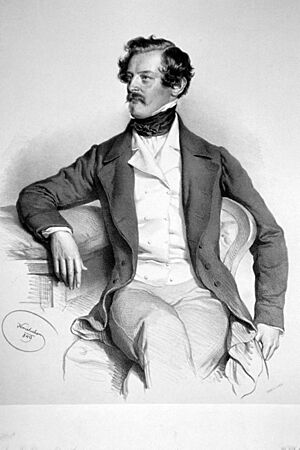Baron Alexander von Bach facts for kids
Quick facts for kids
Alexander von Bach
|
|
|---|---|

Portrait of Alexander von Bach (c. 1849) by Josef Kriehuber.
|
|
| Interior Minister of the Austrian Empire | |
| In office 28 July 1849 – 22 August 1859 |
|
| Monarch | Francis Joseph I |
| Prime Minister | Prince Felix of Schwarzenberg (1849–1852) Count Karl Ferdinand von Buol (1852–1859) |
| Preceded by | Franz Stadion, Count von Warthausen |
| Succeeded by | Count Agenor Gołuchowski |
| Personal details | |
| Born | 4 January 1813 Loosdorf, Austria |
| Died | 12 November 1893 (aged 80) Schöngrabern, Austria |
Alexander, Baron von Bach was an important Austrian politician. He was born on January 4, 1813, in Loosdorf, Austria. He passed away on November 12, 1893, in Schöngrabern, Austria.
Bach is best known for creating a system of strong central government. This system was put in place at the start of Emperor Franz Joseph I of Austria's rule.
Contents
Who Was Alexander von Bach?
Early Life and Career
Alexander von Bach grew up in Loosdorf, Lower Austria. His family had a background in law. His father worked as a judge.
Bach became a doctor of laws at just 24 years old. He then started working for the Austrian government. He served in this role for nine years.
People saw him as a promising young reformer. He was known as a liberal lawyer. He was even called a "minister of barricades" early in his career.
He first served as the Minister of Justice from 1848 to 1849. After that, he became the Minister of the Interior. He held this important position from 1849 to 1859.
Leading the Interior Ministry
As Minister of the Interior, Bach wanted to change the old system. This system was very strict and had been led by Klemens von Metternich. However, Bach did not want to go as far as the revolutionaries of 1848 wished.
Bach was known for changing his views often. This allowed him to adapt to different political situations. He gradually started to support more conservative ideas.
In March 1849, he supported Prince Felix of Schwarzenberg's plan. This plan aimed to centralize power in the Austrian Empire. This decision caused strong feelings among Hungarian people.
After Prince Schwarzenberg died in 1852, Bach became very influential. He largely guided the policies for Austria and Hungary. He worked to centralize how the Austrian Empire was run. This meant more decisions were made by the central government.
Bach's Absolutism
During his time, Bach also introduced some strict policies. These policies limited freedom of the press. They also stopped public trials, making legal processes less open.
This period became known as "neo-absolutism" or Bach's absolutism. It meant the emperor had almost complete power.
In August 1855, a special agreement was made. It was called a concordat. This agreement gave the Roman Catholic Church more control over schools and family life.
Bach was recognized for his work in 1854. He was given the title of Baron (Freiherr). He also helped guide the Science Academy from 1849 to 1859.
Later Years
Bach's time in office ended in 1859. This was largely because Austria lost a war in Italy. They fought against the Kingdom of Sardinia and Napoleon III.
His military reforms had focused too much on the army. This meant less attention was given to building factories and improving roads. This weakened the country's overall strength.
After leaving his government role, Bach became an Ambassador. He served in the Holy See (Vatican City) from 1859 to 1867. He lived a quiet life after that. Alexander von Bach passed away in 1893.
 | Victor J. Glover |
 | Yvonne Cagle |
 | Jeanette Epps |
 | Bernard A. Harris Jr. |

